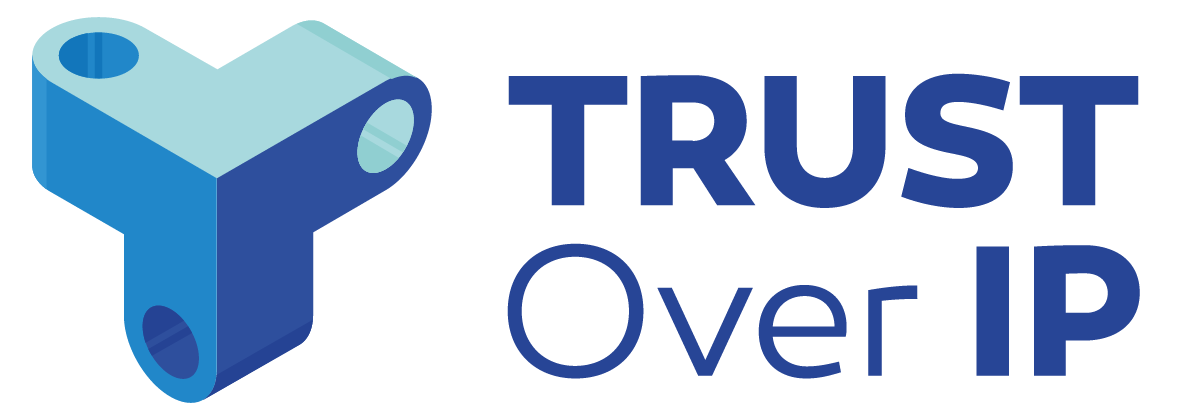Decentralized Trust Graph Working Group
The purpose of the Decentralized Trust Graph Working Group (DTGWG) is to define the standards for building decentralized trust graphs—graphs of trust relationships between people, groups, organizations, AI bots, and so on — using verifiable identifiers (such as W3C Decentralized Identifiers (DIDs) 1.0), and verifiable digital credentials (such as W3C Verifiable Credentials Data Model 2.0) together with the other technical and governance features of the ToIP stack.
Work on things like: define the socio-technical standards for a decentralized trust graph where there is no centralized database and all parties control their own subgraph of trust relationships. This work includes specifying requirements for key management and recovery, verifiable identifiers, verifiable credentials, verifiable relationship credentials, social vouching, relationship cards (r-cards), privacy-preserving zero-knowledge proofs, trust task protocols, trust registries, out-of-band introductions, UI/UX affordances, decentralized naming and discovery mechanisms, and governance considerations.
Technology Stack Working Group – 3
The Technology Stack Working Group defines (directly or by reference) the technical standards, test suites, and interoperability certification standards for the Trust over IP architecture stack.
Work on things like: Laws of Identity White Paper, Technical Guide for our four layer stack, Design Principles for the ToIP Stack, Trust Registry Specification and APIs, Test Suites for Interoperability Working Group for Good Health Pass and other Ecosystems Test Suites.
Ecosystem & Governance Working Group
The Ecosystem & Governance Working group is a place to incubate new projects. It provides a forum to share and learn best practices about ecosystem and governance implementation and explore innovative design ideas. The working group promotes collaboration and alignment across ecosystems, and provides a center of excellence for education about ToIP Layer Four ecosystems that work within the foundation or externally.
Bring your project to ToIP or join projects under way such as: YOMA , PCDS, Cardea.
Collaborate on publishing thought leadership white papers related to your projects and other community focused papers such as: Introduction to the ToIP , Decentralized SSI Governance, Human Trafficking & Safety Response, or ecosystem implementation plans and frameworks, Risk Assessment Templates and Guide, Governance Metamodel Specification and Guide, Trust Assurance and Certification Control Document Templates and Guide, Trust Criteria Matrix Template and Guide and the ToIP Governance Architecture Specification.
KERI Suite Working Group (KSWG)
The KERI Suite Working Group focuses on the core specifications associated with Key Event Receipt Infrastructure (KERI), an innovative type of decentralized key management infrastructure that benefits from a novel key rotation scheme called key pre-rotation based on the work of Dr. Sam Smith. The KERI Suite includes the main KERI specification plus additional specifications for encoding, credentials, and other cryptographic data structures and protocols. The Working Group collaborates on protocol details, security and privacy protections, implementation considerations and provides core input into other ToIP specifications, such as the Trust Spanning Protocol.
Work on things like: The core specifications – Key Event Receipt Infrastructure (KERI) specification, Authentic Chained Data Container (ACDC) specification, Composable Event Streaming Representation (CESR) and other ancillary specifications.
Concepts and Terminology Working Group
The Concepts and Terminology Working Group’s mission is to assist other TOIP Working Groups, Task Forces, and other ToIP-related communities to develop the concepts and terms they need, to establish a shared understanding, both within their own projects and across the decentralized digital trust industry.
Work on things like: Concept Models (aka Mental Models), Terms Wikis, Glossary Management/Versioning/Linking.
Human Experience Working Group
The Human Experience Working Group examines the design features of digital systems, their governance and the business processes that support them, which make interactions or actors trustable, in the contextual and subjective experience of those using them.
Work on things like:UX Design principles, accessibility standards, best practice UX & HCI examples, and novel human interface guidelines for self-sovereign identity and decentralized digital trust infrastructure; Providing toolkits for inclusive and respectful design; Researching socio-cultural methods of building trustworthiness between people, organizations and technology such as trust rituals and rites of passage.
Data Modeling & Representation Working Group (DMRWG)
The scope of the Data Modeling & Representation Working Group (DMRWG) is to define specifications, best practices and standards related to data modeling, plus logical and concrete representations as to how data is stored, processed and transmitted across all aspects of the ToIP stack, whether these standards are hosted at the Linux Foundation or external to it.
AI & Human Trust Working Group
The AI & Human Trust Working Group (AIM WG) is a chartered working group within the Trust over IP (ToIP) Foundation, dedicated to exploring how trust can be built, maintained, and verified in interactions involving AI technologies. The group’s mission is twofold: first, to apply ToIP principles and infrastructure to enhance human trust in AI systems; and second, to explore how AI itself can be used to address complex trust challenges in digital ecosystems. AIM WG produces insight reports, white papers, and technical recommendations, with current focus areas including the use of the Trust Spanning Protocol (TSP) to support trustworthy AI interactions, communication protocols between AI agents and systems, and mechanisms for ensuring authenticity, provenance, and accountability. Broader topics include agent identities, personhood, and the design of frameworks that support delegation and control of AI behaviors—paving the way for a more trustworthy integration of AI into human-centric systems.
